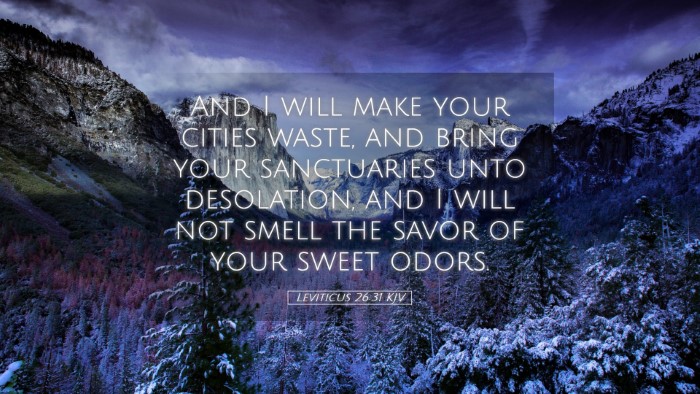Commentary on Leviticus 26:31
Verse: "And I will make your cities waste, and bring your sanctuaries unto desolation, and I will not smell the savour of your sweet odours."
Introduction
This verse arises within a larger context of blessings and curses articulated in Leviticus 26. It presents an important aspect of God’s covenant with Israel, emphasizing the consequences of disobedience. The verse warns against the repercussions of idolatry and neglecting God’s statutes, portraying a solemn tone that reflects the severity of divine judgment.
Commentary Insights
-
Matthew Henry:
Henry emphasizes the gravity of disobedience to God, interpreting this verse as a declaration of impending judgment. He notes that God's refusal to find pleasure in the sacrifices made by His people illustrates a state of alienation due to sin. Henry points out that the destruction of the cities and sanctuaries highlights the importance of worship and the communal aspect of faith within Israel.
-
Albert Barnes:
Barnes remarks on the phrase "make your cities waste" as indicative of complete desolation. He suggests that this desolation is both a physical and spiritual abandonment—indicating that God’s presence departs from the midst of His people. The reference to sweet odors represents the sacrifices that God once cherished, which are now rendered worthless because of Israel’s disobedience and idolatry.
-
Adam Clarke:
Clarke's commentary focuses on the social and spiritual ramifications of Israel's failure to adhere to God’s commandments. He draws attention to the loss of God's favor, which translates into societal breakdown and lack of divine intervention. For Clarke, the "sweet odours" represent the heart of worship that has been corrupted, exemplifying that without genuine faithfulness, rituals become meaningless.
Theological Implications
The theological implications of Leviticus 26:31 are profound, particularly concerning God’s holiness and the nature of sin. The verse serves as a stark reminder that God desires authentic worship, not mere ritual. The desolation of the cities can be seen as a metaphor for the spiritual desolation that occurs when the community strays from God’s commandments. It underscores the idea that the presence of God cannot dwell among those who turn their hearts away from Him.
Divine Judgment and Human Responsibility
This scripture highlights a critical relationship between divine judgment and human responsibility. The condition of Israel's cities and their sanctuaries reflects a direct consequence of their actions. While God's judgments may appear harsh, they are rooted in His love and desire for His people to turn back to Him. This aligns with the biblical narrative where God continually invites His people to repent and return to a covenantal relationship.
Application for Modern Believers
For pastors, students, and theologians, Leviticus 26:31 challenges the contemporary church to reflect on its commitment to God’s ways. It serves as a call to examine the state of worship and the authenticity of faith within both individual and corporate contexts. The removal of God’s presence symbolizes the consequences of a church that has become institutionalized or complacent in its spiritual fervor.
The Call to Authentic Worship
In a world where distractions abound, believers are called to consider what it means to offer "sweet aromas" to God. This can be interpreted as the heartfelt devotion expressed in prayer, worship, and service. Just as ancient Israel’s sacrifices became meaningless without true obedience, so too can modern worship become hollow without genuine hearts seeking after God.
Conclusion
Leviticus 26:31 serves as a critical reminder of the consequences of idolatry and disobedience. Through insights from prominent biblical commentators, we are encouraged to understand that a vibrant relationship with God necessitates faithfulness and true worship. The desolation of cities and sanctuaries symbolizes the dire spiritual state that follows abandonment of God’s commandments. For today’s believers, this verse is an exhortation to pursue an authentic and committed relationship with the Lord, ensuring that our worship remains pleasing to Him.


